I recently wrote a guide to earthbound sci-fi and a post about earthbound sci-fi TV shows. Now we’re going to be discussing earthbound sci-fi movies. While trips to outer space are great, many of my favorite films involve science fiction that stays on Earth. It’s fascinating to see how aliens, artificial intelligence, and other forms of advanced science might affect the world we live in. Such stories make us think deeply about ethics and what it means to be human.
The movies included in this post revolve around different aspects of science fiction. They present unique situations and the ramifications of dealing with the issues that arise. So, if you’re going the earthbound science fiction route, watching these films should give you plenty of ideas for your own contest entry.
Here are three earthbound sci-fi movies you can study to improve your writing.
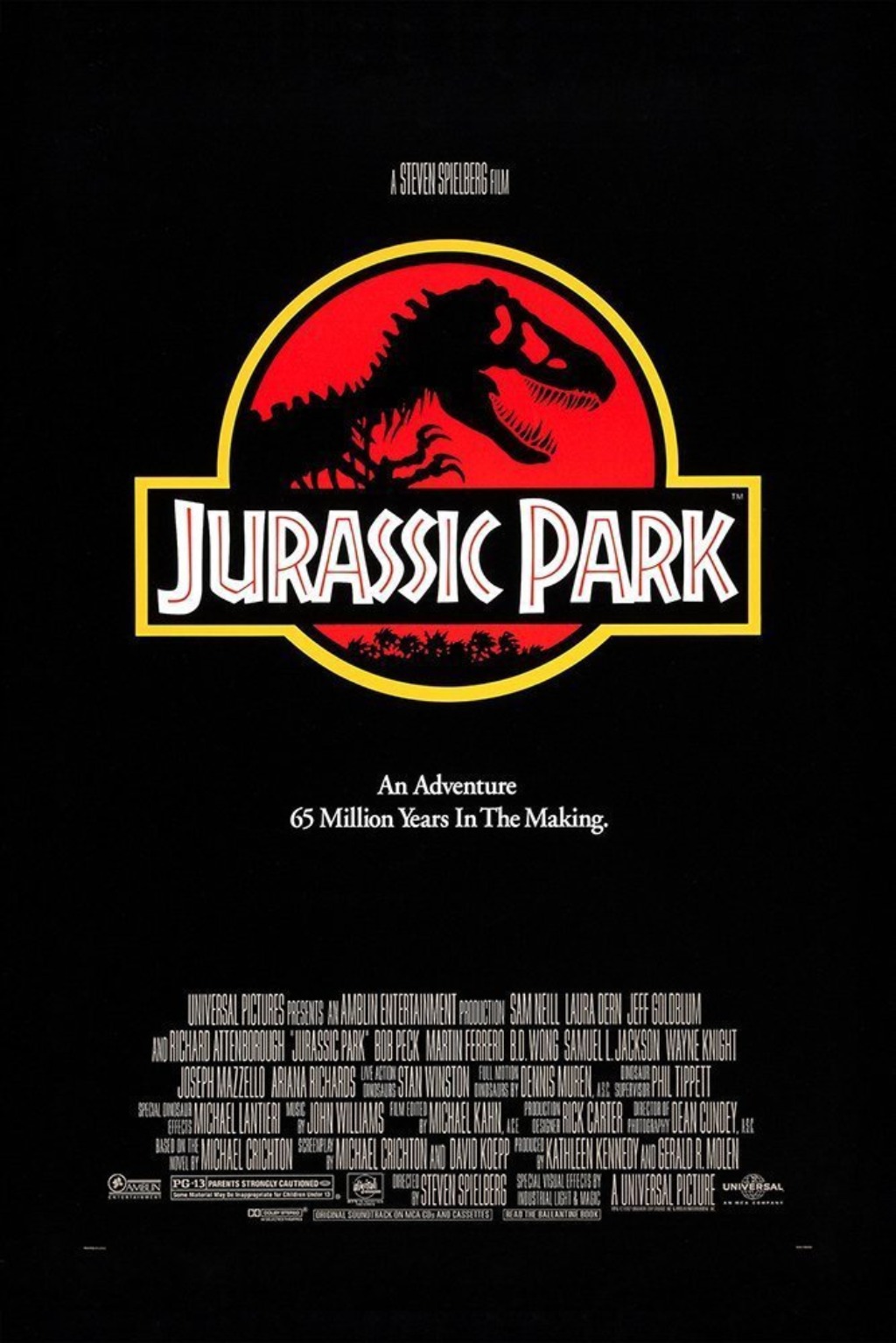
Jurassic Park: Suspense
Where to watch it: Hulu
This 1993 film is based on the science fiction novel of the same name by Michael Crichton. It tells the story of how advancements in scientific technology have enabled John Hammond to clone dinosaurs and create an island theme park where visitors can come to see them. He invites four individuals, including two of his grandchildren, to visit the park. But when a park employee attempts to steal dinosaur embryos, critical security systems are shut down and the dinosaurs run free through the park. Like many members of my generation, I saw this movie as a kid, and it nearly scared me to death. But that didn’t stop it from becoming one of my favorite films.
We open on rustling trees and a group of men nearby wearing construction helmets emblazoned with the “Jurassic Park” logo. Some of the men in the group carry large guns. A forklift carries a large crate. The men try to unload the crate, but it goes wrong and a man gets pulled inside the crate by the unseen creature. As the other men try to wrestle him free, we see the eye of a dinosaur.
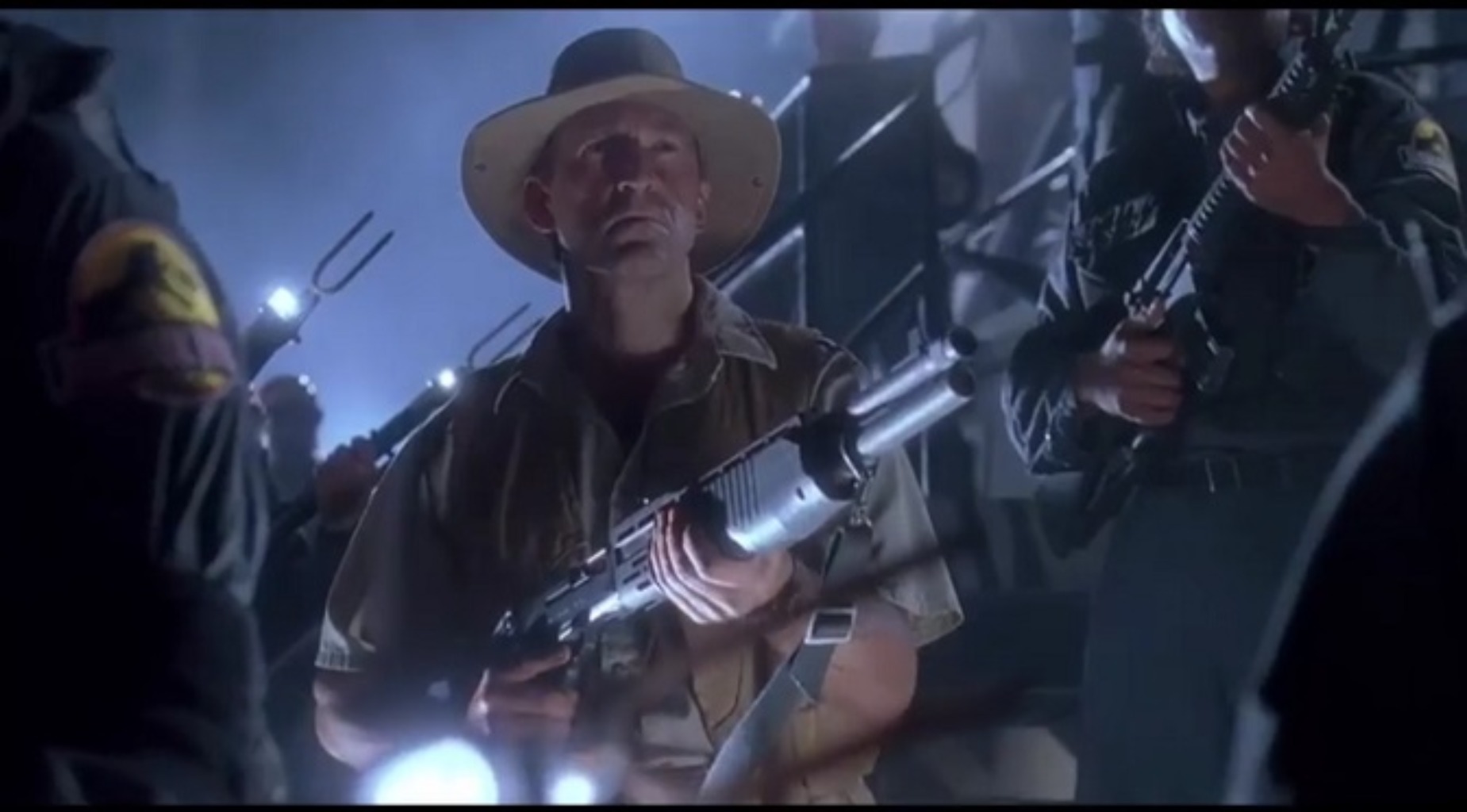
We cut to Gennaro standing on a raft being pulled on a rope to shore. Words on the screen tell us that this is the Mano de Dios Amber Mine in the Dominican Republic. Gennaro angrily remarks that Hammond isn’t there and that they are facing a $20 million lawsuit from the family of the worker who got killed. Juanito tells him that Hammond wants to be with his daughter who is getting divorced. Gennaro points out that the incident has raised some serious security questions about the park, and it makes investors nervous, so he promised to conduct a thorough inspection. Juanito says that Hammond hates inspections since they slow everything down, but Gennaro says the investors will pull the funding. He tells Juanito that if two experts sign off on the island, the insurance guys will back off. He says they want Alan Grant, and Juanito says that he’ll never get him out of Montana since Grant is a digger like him.
A great deal is accomplished in just the first five minutes of this film. Immediately we see that dinosaurs are involved in this park and the dangers that go with them. Genarro’s conversation with Juanito continues to impress upon the audience the issues that could arise with this park. It also reveals that Gennaro is more concerned with the park’s funding than the human life that was lost. We are introduced to Grant, one of the story’s main characters, as well as his reluctance to come sign off on the park. The first scene is jam-packed with suspense as the workers handle the crate, and we see just enough of the dinosaur to be frightened by it (probably more so than if we saw the entire creature). You can learn a lot from Jurassic Park about how to get your story off to an exciting start.
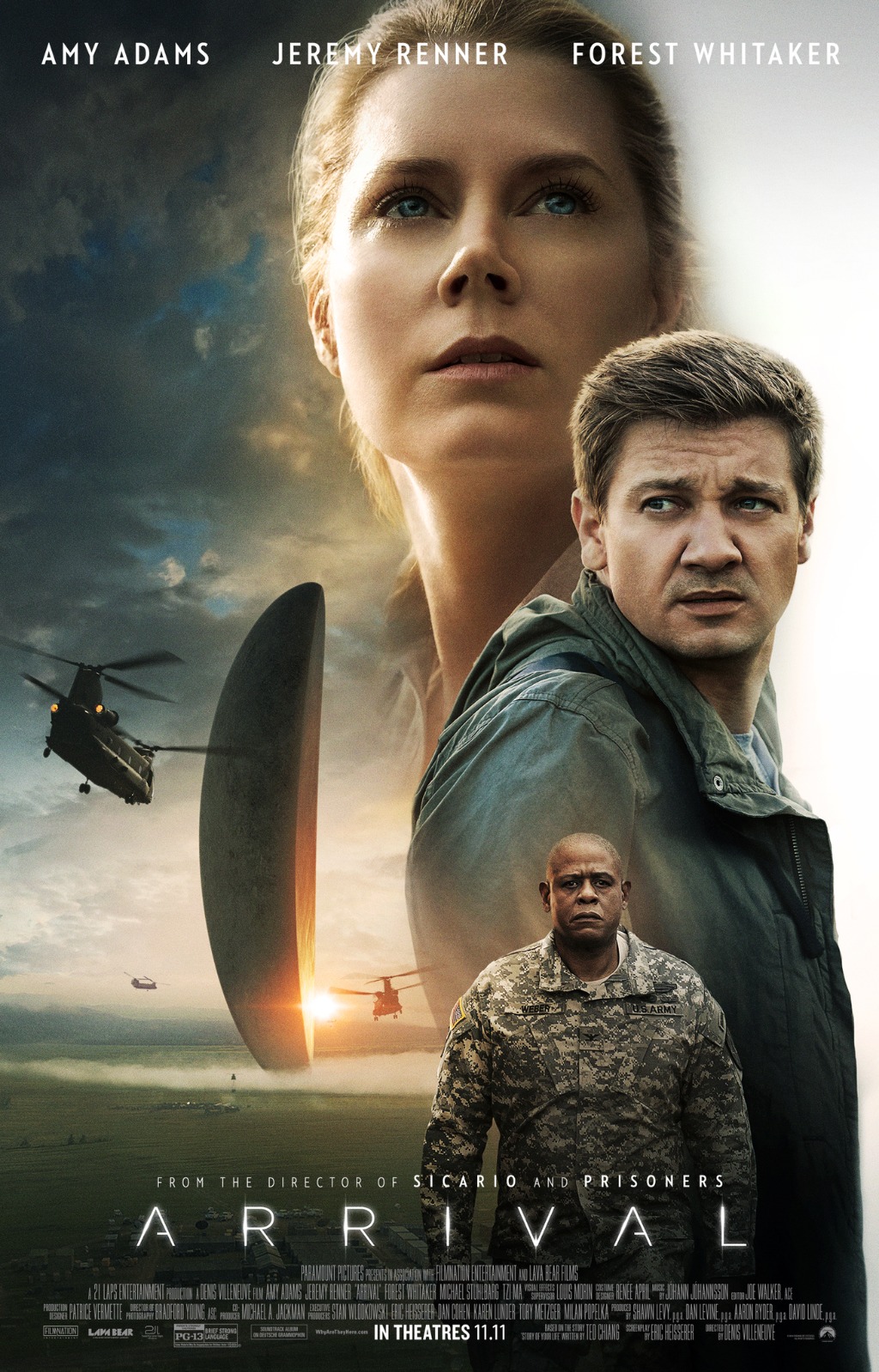
Arrival: Nonlinear Storytelling
Where to watch it: Pluto TV
I included the short story “Story of Your Life” by Ted Chiang in my post about alien-centric stories. That story provided the basis for this marvelous film. In the film, extraterrestrial beings appear on Earth and linguist Louise Banks is brought in to try to communicate with them and figure out their intentions. As she begins to understand these lifeforms and their nonlinear language, she gains the ability to see the future and all the joy and suffering it will bring. Unlike another favorite alien story of mine, The Three-Body Problem by Liu Cixin, Arrival takes an optimistic view of what Earth’s first contact with aliens might be like.
The film begins with the view outside the windows of a house, and we can see a telescope in one corner and a desk with a bottle of wine and two partially filled glasses in the other. Louise says in voiceover that she used to think that this was the beginning of “your” story, and that memory doesn’t work like she thought it did. Then we see Louise being handed a baby by a blurred-out person. They are both wearing wedding rings. Then Louise is suddenly playing outside with a child dressed up like a cowgirl. In voiceover, Louise says she remembers moments in the middle as we see various moments in her daughter’s life, including a medical exam as a teenager followed by clearly devastating news. “And this was the end,” Louise says in voiceover, and we see her in a hospital room with her deceased daughter.
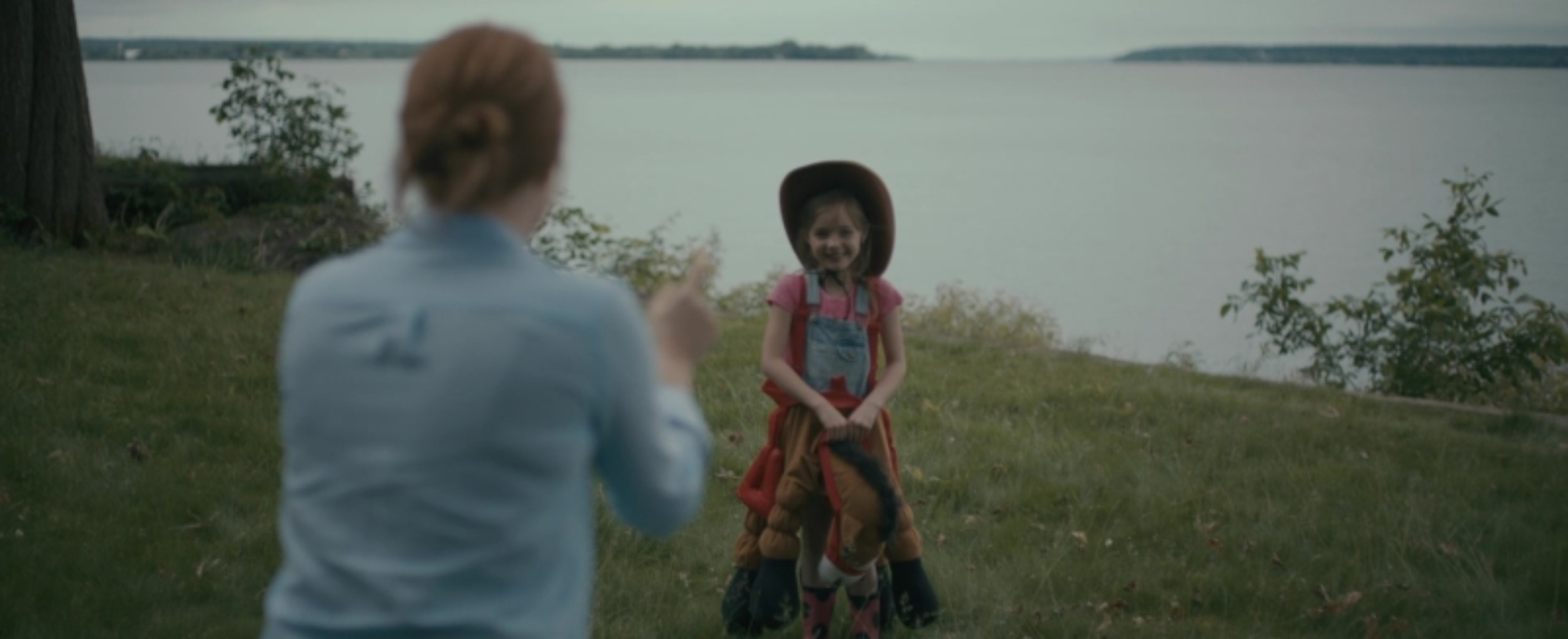
Now Louise says she’s not so sure she believes in beginnings and endings. We see her walking past a group of people crowded together on the way to teach a linguistics class. She is surprised to find most of her students absent. As she starts teaching, the few students that are there get notifications on their phones, and one asks Louise to turn the TV to a news channel. Without seeing what’s on the screen, we hear that “objects” have appeared in various places around the globe. Then an alarm goes off and Louise dismisses the class. She files out with the other students and as she makes her way to her car, she sees planes whizzing by.
Arrival wastes no time in presenting its unique, nonlinear form of storytelling. We start with snatches of Louise’s life with her daughter, skipping over long periods of time. She makes the point in voiceover that though she once saw her daughter’s life in this linear fashion, she’s no longer sure she believes in beginnings and endings. Then we flash back to before her daughter is born when the aliens make first contact with strange, large objects appearing all over the world. It is wonderful how little we actually see of the objects at first, which helps to create mystery around the nature of these aliens. If you are planning on writing a story with a nonlinear structure, this is definitely a film I would encourage you to watch in its entirety. The short story it's based on (included in this collection) could also be very helpful.
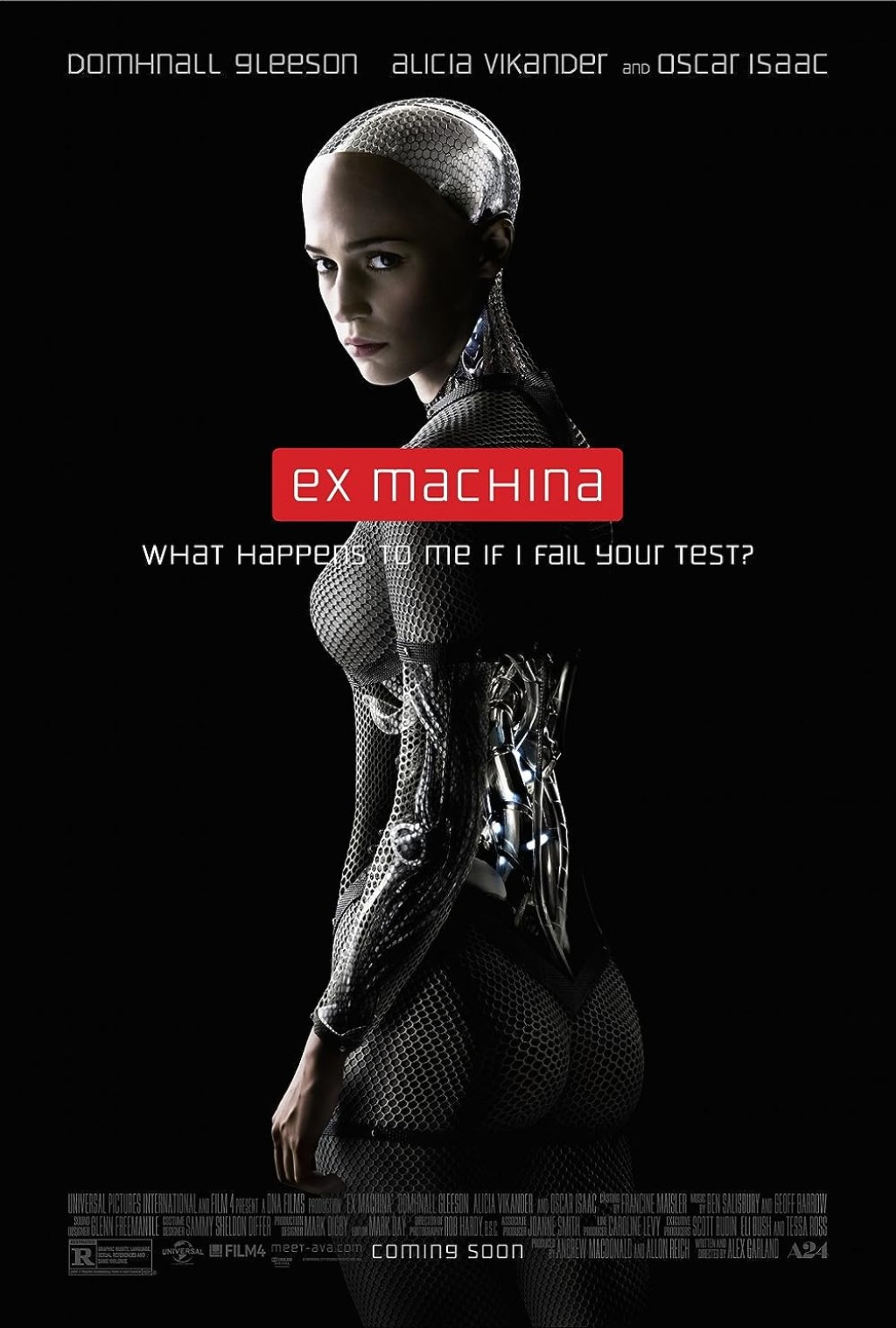
Ex Machina: Tackling Big Questions
Where to watch it: Max
I went to see Ex Machina in the theater in 2014 with no real expectations—I knew only that it was a sci-fi film that had to do with artificial intelligence. I was blown away by the film’s unique premise, the smartness of the script, and how it really keeps you on the edge of your seat. The film follows Caleb, a young programmer who wins a competition to spend a week with Nathan, the reclusive CEO of his company, at a private mountain retreat. When Caleb arrives, he finds that he will have to participate in an experiment to evaluate the human qualities of a very advanced humanoid AI (who looks like a beautiful girl). The ethical questions that arise from this premise are fascinating to think about, and very well-presented.
We open on a hip-looking office (similar to Google) where Caleb is coding at his desk. He clicks a message saying, “VIP EMAIL RECEIVED” and we see “FIRST PRIZE”. Caleb immediately texts a friend that he won. The webcam on his computer films everything he does. He gets several messages congratulating him and the whole office applauds. We cut to Caleb in a helicopter asking the pilot how long until they get to “his” estate, to which the pilot laughs and says they’ve been flying over his estate for the past two hours. The helicopter lands in a remote mountainous area. Caleb asks the pilot if he’s really leaving him there and the pilot says that this is as close as he’s allowed to get to the building. Caleb can’t even see the building and is told to follow the river.
In a nice suit, Caleb drags his suitcase through the wilderness and finds that his phone has no signal. He reaches a structure where an automated voice says his name and tells him to approach the console and face the screen, which takes his picture and instantly prints it on a keycard. He is then able to open the door, which closes behind him. He walks through a lovely, strange house made mostly of glass. He eventually finds Nathan punching a punching bag, who says he’s been looking forward to this week with Caleb. He says he has a hangover, and Caleb asks if it was a good party, then embarrassedly realizes there wasn’t a party. Nathan asks if they can just be two guys, rather than employer and employee.
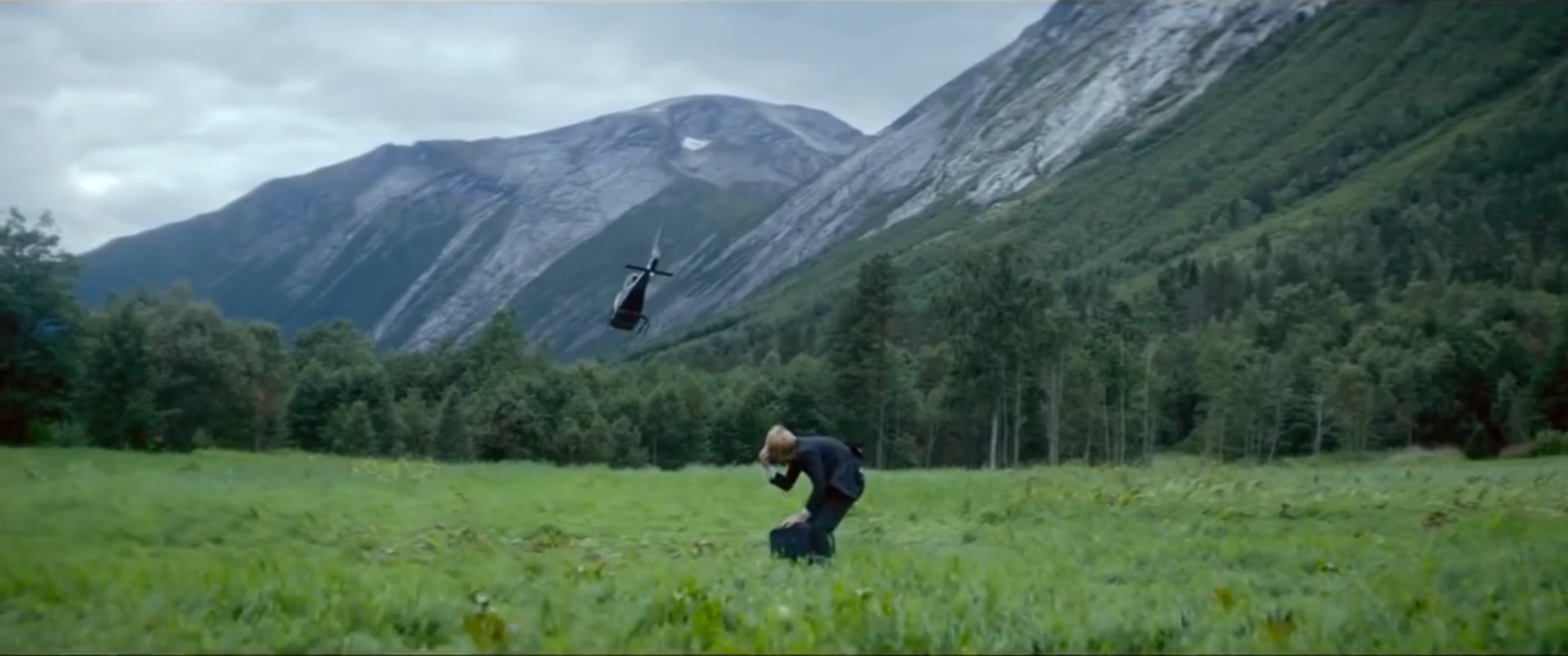
As they walk through the house, Nathan explains that Caleb’s keycard will open some doors but not others. He shows Caleb his room, which is stylish but has no windows. Nathan reveals that this isn’t a house, but a research facility and he wants to share that research with Caleb. First Caleb must sign a non-disclosure agreement. Caleb has reservations—like about how the agreement allows Nathan to monitor all his data—but ultimately signs. Nathan asks if Caleb knows what the Turing Test is and Caleb replies that it’s when a human interacts with a computer and if the human doesn’t know they’re interacting with a computer, the test is passed. The pass means that the computer has artificial intelligence. Nathan reveals that over the next few days, Caleb is going to be the human component in the Turing Test.
In less than fifteen minutes, Ex Machina is able to introduce its main characters, create a remote, unsettling atmosphere, and establish its central premise. Right off the bat, we know that this film will be analyzing the difference between humans and AI, and whether a human could tell the difference. Other questions also come up, like if Nathan has been able to create such an advanced AI, is it ethical to study it like a lab rat? This is a movie that will have you poring over several big questions about the meaning of humanity. Watching it will help you add depth to your own writing.
You may be feeling stressed about making time to write, but you can kick back and have a movie marathon and work on your story at the same time! Between my low fantasy and earthbound sci-fi articles, you should be well-prepared to delve into the effects magic and advanced tech might have on our world with your writing.
Soak Yourself in Fiction
Follow us on Facebook | Instagram | Twitter | Discord